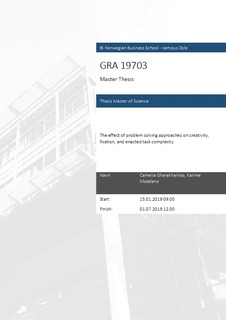The effect of problem solving approaches on creativity, fixation, and enacted task complexity.
Master thesis
Permanent lenke
http://hdl.handle.net/11250/2626123Utgivelsesdato
2019Metadata
Vis full innførselSamlinger
- Master of Science [1621]
Sammendrag
The purpose of this experimental study was to investigate the effect of
problem solving approaches on the creative process and the creative outcome.
Particularly, we explored the effect of action-oriented problem solving,
unconscious thought, and analytical thought on creativity, enacted task complexity,
and fixation. The effect of an incubation period was investigated as a potential
moderator in the relation between problem solving approaches and creativity and
between problem solving approaches and fixation. Participants included 129
students from BI Norwegian Business School who completed the nine-dot problem.
Results showed that participants in the unconscious thought condition performed
significantly better than participants in the analytical thought condition and the
action-oriented problem solving condition, followed by the analytical thought
condition. Furthermore, results showed that participants in the analytical thought
condition became significantly more fixated than the two other conditions during
the problem solving process. Results did not support the moderating effect of an
incubation period. The insights obtained in this study may help organizations
facilitate individual creativity, which today is considered one of the most important
drivers of growth, innovation, and success.
Beskrivelse
Masteroppgave(MSc) in Master of Science in Leadership and Organizational Psychology - Handelshøyskolen BI, 2019
